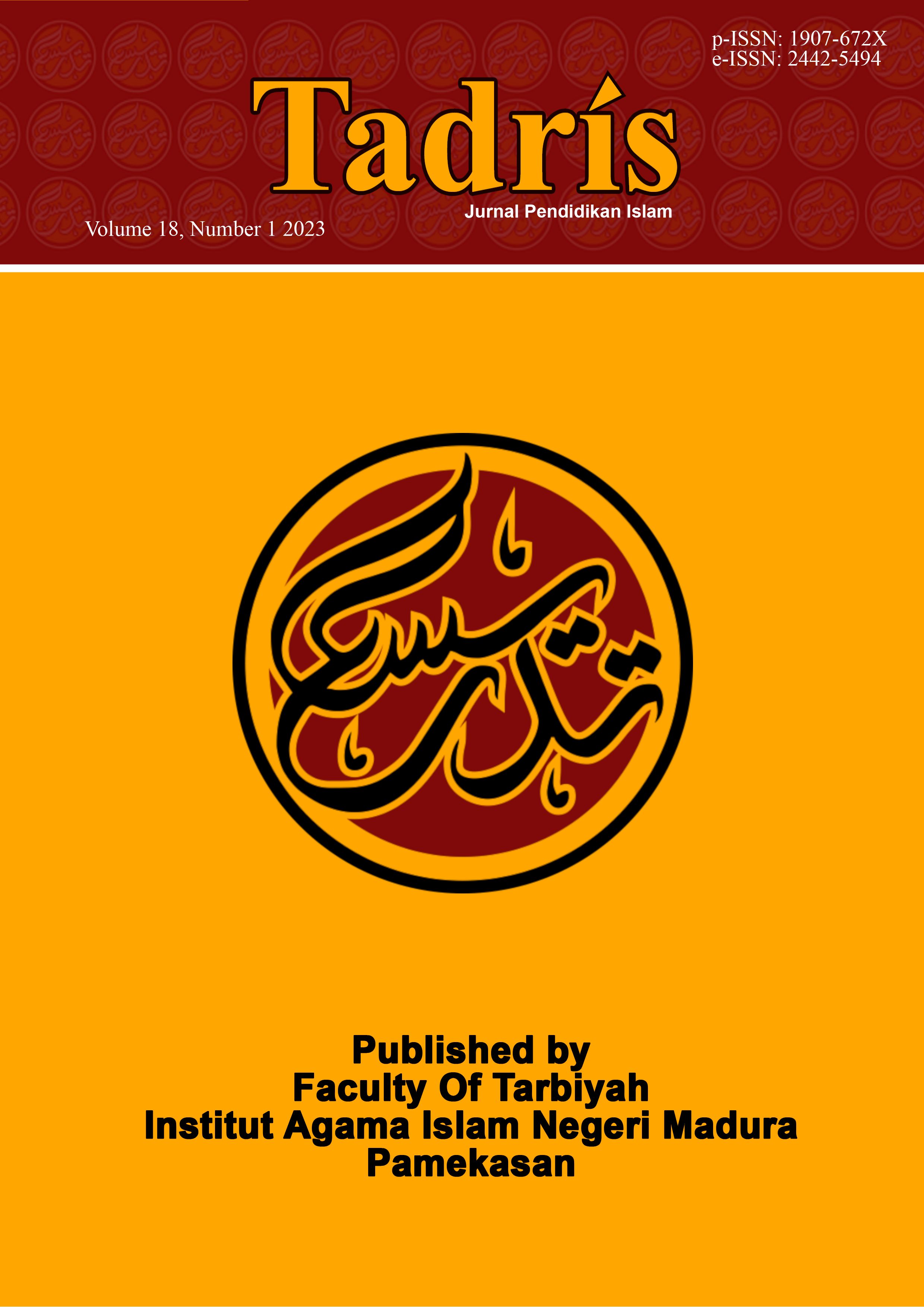The Madrasah Excellent Class Learning Innovation Management with Student-Centered Approach Base in Improving Learning Achievement
 Abstract views: 133
,
Abstract views: 133
,
 PDF downloads: 114
PDF downloads: 114
Abstract
This article aims to find and analyze the planning, implementation, and evaluation of learning innovations in excellent classes to improve learning achievement. This study applied a qualitative approach designed descriptively through a case study research type with a multicase research design. The research sites were conducted at MI International Sabilillah Sampang and MTs Negeri 3 Sumber Bungur Pamekasan. As a key instrument in the data collection, the researcher went directly to the field by applying previously planned techniques through participant observation, in-depth interviews, and documentation. Data analysis applied a case study with a multicase design which was analyzed through single data and data across cases. The study results show that the Excellent Class Learning Innovation lesson plan improves Learning Achievement at MI International Sabilillah Sampang and MTs Negeri 3 Sumber Bungur Pamekasan is built through input, excellent learning processes, and excellent output. Second, the implementation of excellent class learning innovations in improving learning achievement at MI International Sabilillah Sampang and MTs Negeri 3 Sumber Bungur Pamekasan, namely through a curriculum enriched with Olympiads, class management, standardized teachers, media management, and boarding schools. Third, evaluating learning outcomes using a test and non-test approach includes aspects of knowledge, attitudes, and skills with high competition standards so that student achievement and the reputation of the madrasah is increasing. In comparison, evaluating learning innovation programs uses the CIPP model by developing four components: context, input, process, and product.
Downloads
References
Ahyar. “Peningkatan Kinerja Madrasah Melalui Pendekatan Kultur.” Jurnal Taskif Fakultas Tarbiyah 11, no. 1 (2012).
Azkiyani, Rahmatun Nida, Novan Ardy Wiyani, and Ahmad Sahnan. “Manajemen Kelas Unggulan di MTs Negeri 3 Pemalang.” Leader: Jurnal Manajemen Pendidikan Islam 1, no. 1 (May 22, 2023): 1–13. https://doi.org/10.32939/ljmpi.v1i1.2250.
Bahtiar, Deni Sultan. Manajemen Waktu Islami. Jakarta: Amzah, 2012.
Bass, Bernard M. Organizational Psychology. Boston: Allyn and Bacon, 1965.
Benavides. The Search for Innovative Learning Environments Innovating to Learn, Learning to Innovate. United Kingdom: OECD, 2008.
Departemen Agama RI. Al-Qur’an Terjemahan. Bandung: Sigma, 2007.
Haningsih, Sri. “Peran Strategis Pesantren, Madrasah dan Sekolah Islam di Indonesia.” EL-TARBAWI 1, no. 1 (2008): 27–39. https://doi.org/10.20885/tarbawi.vol1.iss1.art3.
Ivancevich, John M., James L. Gibson, and Robert Konopaske. Organizations: Behavior, Structure, Processes. New York: McGraw-Hill Education, 2011.
Johnson, LouAnne. Teaching Outside the Box: How to Grab Your Students By Their Brains. Translated by Dani Dharyani. 2nd edition. San Francisco, CA: Jossey-Bass, 2011.
Jones, Vern, and Louise Jones. Comprehensive Classroom Management: Creating Communities of Support and Solving Problems. London: Pearson, 2015.
Karwanto. “Keterampilan Manajerial Peningkatan Keunggulan Pembelajaran (Studi Multi Kasus pada Tiga SMA Unggulan di Kota Semarang).” Disertasi, Universitas Negeri Malang, 2009.
Locke, Edwin A. “Toward a Theory of Task Motivation and Incentives.” Organizational Behavior and Human Performance 3, no. 2 (May 1, 1968): 157–89. https://doi.org/10.1016/0030-5073(68)90004-4.
Masyni. “Manajemen Inovasi Pembelajaran Efektif di SMP Negeri 4 Samarinda (Studi Kasus di SMP Negeri 4 Samarinda).” CENDIKIA 5, no. 1 (December 1, 2020): 59–72.
Muhaimin. Pemikiran dan Aktualisasi Pengembangan Pendidikan Islam. Jakarta: Rajawali Press, 2011.
Muhaimin, Suti’ah, and Sugeng Listyo Prabowo. Manajemen Pendidikan (Aplikasinya dalam Penyusunan Rencana Pengembangan Sekolah / Madrasah). Jakarta: Prenada Media, 2015.
Seagal, Sandra. “Human Dynamics: A New Framework for Understanding People and Realizing the Potential in Our Organizations.” In Reflection on Creating Learning Organizations, edited by Kellie T. Wardman, 1st edition. Cambridge: Pegasus Communications, 1997.
Siswanto. “Manajemen Peningkatan Mutu Madrasah Unggulan di Pesantren (Studi Multikasus pada MA Nurul Jadid Paiton Probolinggo, MA Al-Amien 1 Putri Pragaan Sumenep dan MAN Tambakberas Jombang.” Disertasi, IAIN Surabaya, 2013.
Documentation :
Academic Achievements of MI Internasional Sabilah Sampang and MTs Negeri 3 Sumber Bungur Pamekasan
The Curriculum of MTsN 3 Sumber Bungur Pamekasan, Academic Year 2021/2022
Profile of MI Internasional Sabilillah Sampang, Academic Year 2021/2022.
Copyright (c) 2023 TADRIS: Jurnal Pendidikan Islam

This work is licensed under a Creative Commons Attribution-NonCommercial 4.0 International License.
The journal operates an Open Access policy under a Creative Commons Non-Commercial 4.0 International license. Authors who publish with this journal agree to the following terms:
- Authors retain copyright and grant the journal right of first publication with the work simultaneously licensed under a
 Commons Attribution-NonCommercial 4.0 International License
Commons Attribution-NonCommercial 4.0 International Licensethat allows others to share — copy and redistribute the material in any medium or format, and adapt — remix, transform, and build upon the material.
- Authors are able to enter into separate, additional contractual arrangements for the non-exclusive distribution of the journal's published version of the work (e.g., post it to an institutional repository or publish it in a book), with an acknowledgement of its initial publication in this journal.
- Authors are permitted and encouraged to post their work online (e.g., in institutional repositories or on their website) prior to and during the submission process, as it can lead to productive exchanges, as well as earlier and greater citation of published work (see The Effect of Open Access).














